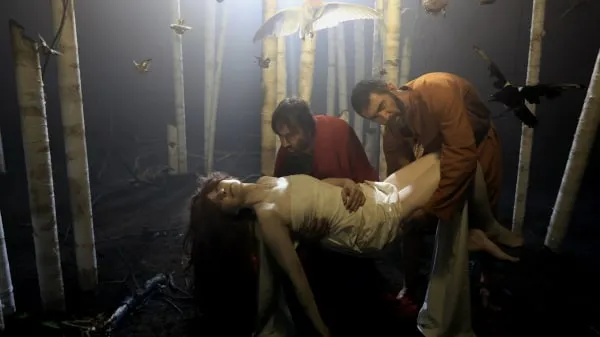Eye For Film >> Movies >> The Deathless Woman (2019) Film Review
The Deathless Woman
Reviewed by: Jennie Kermode

When people gather into armies or movements bent on taking the lives of others on a mass scale, most of them – those who, in other circumstances, might be capable of empathy – do it by conspiring to forget the humanity of their victims, which depends in part on ceasing to see them as individuals. Every now and again, something disrupts that process. She was the wife of the leaders of the local Roma people. She was probably pregnant when the German soldiers came. They riddled her body with bullets. Each time they shot her, so the story goes, she turned back around and swore at them. She would not die. She was still twitching when they put her in the ground.
She would lie there, beneath a small patch of forest in Poland, for decades before her body was eventually retrieved, and then those who found her would have another cause for awe. Hers is the kind of story which gives people the courage to resist and to go on living. Filmmaker Roz Mortimer worked with Roma communities in Poland, Hungary and London to bring her story to life onscreen and, though it, to address the wider story of how Roma people were persecuted by the Nazis and how they still face shocking levels of racist violence today. The result is a film which interweaves elements of drama with what is essentially a documentary presented by fictional characters: a researcher looking for evidence of genocide (Loren O’Dair) and the ‘deathless woman’ herself (Iveta Kokyová).

This film is also significant because it’s the first to address the story of the Holocaust in the Romani language, which remains little-used in cinema, in part because discrimination in education means that Roma people have had a hard time getting into the industry themselves. It’s informed by the Roma tradition of oral histories, with its central characters delivering entangled narratives – one perhaps generated by the other – which carry us from the forest where the woman and her kin were shot to a concentration camp where Roma men rioted in a desperate attempt to survive, and to the site of more recent murders. There are conversations with witnesses whose stories bear notable similarities across time.
The deathless woman is an angry ghost. Is she seeking revenge? Perhaps, at first. Poetic motifs centred around little birds illustrate the dangers of responding to hatred with anger, yet there’s no suggestion that someone so mistreated has options. As the film explores the history of anti-Roma persecution, it also follows her journey through grief and gradual re-evaluation of her purpose. There’s a suggestion of healing, but that’s not something which she – or her people – can achieve without the engagement of others.
The first half of the film, which focuses more heavily on the researcher, is a little slow and uneven. Mortimer has made the classic mistake of becoming so close to her subject that she misjudges the emotional impact which revelations at this stage are liable to have on others. As the film builds up steam, however, this becomes less of a problem, and the second half works well. It’s an introduction to the issues for people from outside the community but, perhaps more importantly, it’s an opportunity for the Roma to take command of the telling of their own story, to raise their voices, to continue that act of resistance.
Reviewed on: 20 May 2022

















